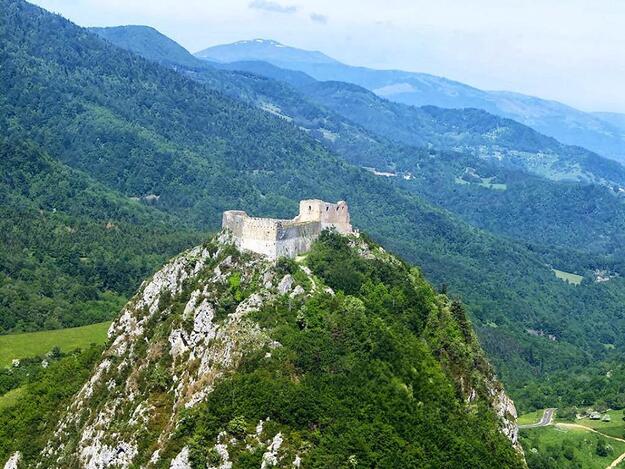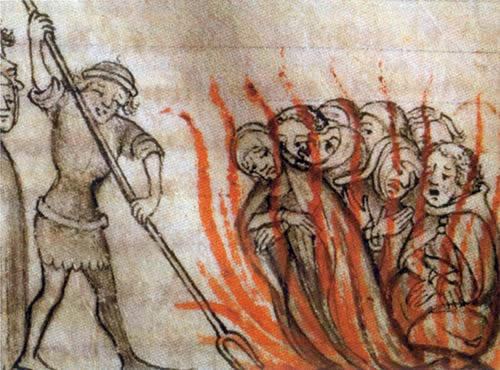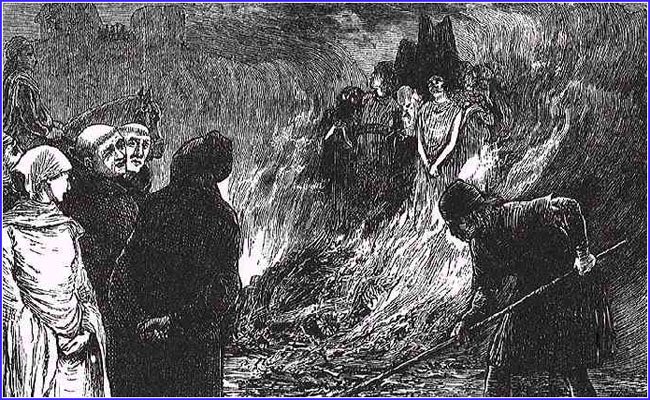Montségur Day
"Unless a grain of wheat falls to the ground and dies, it remains just a grain of wheat; but if it dies, it produces much fruit"
- John 12:24
|
Montségur Day is a holy day for all those who stand for Truth at the cost of their lives. March 16 marks the massacre of the Holy Cathars, a group of Gnostic Christians in southern France in the 12th-14th centuries. In 1208 the Pope ordered the Albigensian crusade against the Cathars, followed by twenty years of war. When the war was ended in 1229, the Inquisition was established to exterminate the remaining Cathars. From May 1243 to March 1244, the Cathar fortress of Montségur was besieged by 10,000 Catholic troops. When the fortress succumbed, March 16, 1244, over two hundred Cathars who refused to renounce their faith were burned in an enormous fire near the foot of the castle. Describing the persecution of Gnostic Christians and the Cathars, Bishop John Cole wrote:
"Gnostic Christianity has existed since the time of the disciples themselves. By around 300 A.D., the Roman Church, which claimed for itself the title of “orthodox” (i.e. straight thinking), began to persecute Gnostic Christians, called them “heretics,” and began a campaign of murder, and genocide that lasted for about 1,500 years. In the Gnostic view, each person as responsible for his own redemption, and while the Church and sacraments are an important part of religious worship, man does not need a Church or priest to mediate between him and God. The Roman Church felt that this was a great threat to its power, and through excommunication the Church held complete control over the people and their governments. "Around the 14th century, the entire area of what is now France converted to Gnostic Christianity, and the Roman Church decided to stomp it out at all costs. First St. Francis of Assisi was sent to persuade the people to follow the Roman Church, but he returned and told the pope that the Gnostics were the most pure Christians he had ever met, and that he refused to try to convert them. Next the pope sent Dominic Guzman to attempt a conversion. He failed and then was given license to form the Holy Inquisition. The pope then sent a papal army on the only crusade mounted against other Christians. No one knows for certain how many Gnostics were killed, but in the town of Beziers, France alone 50,000 were killed in a single day, many victims being infants in their mothers’ arms. The inquisition ultimately went on to torture and murder millions of Gnostics all the way up to the 19th century." |
As recently as 1944, Constant Chevillon, the Patriarch of the Gnostic Church, was assassinated by militants of the Nazi collaborationist Vichy Government.[i] As his body was placed in the ground, the earth gave forth the miraculous simultaneous discoveries of the Nag Hammadi codices in 1945 and the Dead Sea scrolls in 1946, Gnostic scriptures lost for over 1,700 years. Since these discoveries there has been great interest in the beliefs and practices of the Christian Church in the first three centuries.
Still, the persecution of Gnostics has not ended. Even today the Church of Rome continues to call Gnosticism a “danger,”[ii] a “heresy,”[iii] and “an adulterated form of Christianity.”[iv] The Roman Church says of Gnostic Christians that “they are not Christian, they masquerade as Christians.”[v] The Roman Church uses rhetoric that diminishes Gnostics as being “superficial” “Christians of words”[vi] “and having only to do with rationalism and ideas.”[vii] This is a gross mischaracterization of Gnosticism as an intellectual or academic pursuit. On this Montségur Day, the Holy Gnostic Catholic and Apostolic Church affirms that it is a living and joyful tradition. We recognize the personal religious experience of each individual, and practice the Christian sacraments as vehicles for Divine grace.
Remember them, O Lord in Thy kingdom. The faithful who did not adore the Beast and whom the Beast has slain. The faithful who served Thee because they could do no other, who lived in an age when the right to seek Thee was bought with their lives. Remember those who gave more than they could, more indeed than they possessed; more than they ever should have given. They could do no other. Mercy, Lord on all the burned ones of this world. Mercy on all who loved beyond this world. On all who have loved. On all who have had some true thing to love. Amen.
Sources
[i] Ambelain, Robert. "Modern Martinism." Martinism History and Doctrine. Trans. Piers Vaughan. Paris, 1946. 128.
[ii] Falasca, Sefania. "What I Would Have Said at the Consistory." 30Giorni. 1 Nov. 2007. Web. 30 Sept. 2015.
[iii] Williams, Thomas. "Pope Francis: Christians Must Avoid 'Heresy' of a Faraway God." Breitbart. 7 May 2015. Web. 30 Sept. 2015.
[iv] Evangelii Gaudium : Apostolic Exhortation on the Proclamation of the Gospel in Today's World (24 November 2013) | Francis. 24 Nov. 2013. Web. 30 Sept. 2015.
[v] "Vatican Radio." Vatican Radio Vatican Radio. 27 June 2013. Web. 30 Sept. 2015.
[vi] "Joyfully Build Your Lives on Jesus the Rock." Encountering Truth: Meeting God in the Everyday. Ed. Antonio Spadaro. New York: Crown, 2015. Print.
[vii] Evangelii Gaudium : Apostolic Exhortation on the Proclamation of the Gospel in Today's World (24 November 2013) | Francis. 24 Nov. 2013. Web. 30 Sept. 2015.
Still, the persecution of Gnostics has not ended. Even today the Church of Rome continues to call Gnosticism a “danger,”[ii] a “heresy,”[iii] and “an adulterated form of Christianity.”[iv] The Roman Church says of Gnostic Christians that “they are not Christian, they masquerade as Christians.”[v] The Roman Church uses rhetoric that diminishes Gnostics as being “superficial” “Christians of words”[vi] “and having only to do with rationalism and ideas.”[vii] This is a gross mischaracterization of Gnosticism as an intellectual or academic pursuit. On this Montségur Day, the Holy Gnostic Catholic and Apostolic Church affirms that it is a living and joyful tradition. We recognize the personal religious experience of each individual, and practice the Christian sacraments as vehicles for Divine grace.
Remember them, O Lord in Thy kingdom. The faithful who did not adore the Beast and whom the Beast has slain. The faithful who served Thee because they could do no other, who lived in an age when the right to seek Thee was bought with their lives. Remember those who gave more than they could, more indeed than they possessed; more than they ever should have given. They could do no other. Mercy, Lord on all the burned ones of this world. Mercy on all who loved beyond this world. On all who have loved. On all who have had some true thing to love. Amen.
Sources
[i] Ambelain, Robert. "Modern Martinism." Martinism History and Doctrine. Trans. Piers Vaughan. Paris, 1946. 128.
[ii] Falasca, Sefania. "What I Would Have Said at the Consistory." 30Giorni. 1 Nov. 2007. Web. 30 Sept. 2015.
[iii] Williams, Thomas. "Pope Francis: Christians Must Avoid 'Heresy' of a Faraway God." Breitbart. 7 May 2015. Web. 30 Sept. 2015.
[iv] Evangelii Gaudium : Apostolic Exhortation on the Proclamation of the Gospel in Today's World (24 November 2013) | Francis. 24 Nov. 2013. Web. 30 Sept. 2015.
[v] "Vatican Radio." Vatican Radio Vatican Radio. 27 June 2013. Web. 30 Sept. 2015.
[vi] "Joyfully Build Your Lives on Jesus the Rock." Encountering Truth: Meeting God in the Everyday. Ed. Antonio Spadaro. New York: Crown, 2015. Print.
[vii] Evangelii Gaudium : Apostolic Exhortation on the Proclamation of the Gospel in Today's World (24 November 2013) | Francis. 24 Nov. 2013. Web. 30 Sept. 2015.



